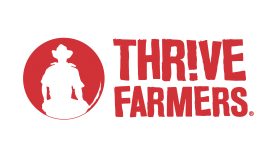

Thrive Farmers International, Inc.

Georgia, United States
December 2016
Agricultural Processing
Agriculture/Growers
Brazil,
China,
Costa Rica,
Egypt,
El Salvador,
Guatemala,
Honduras,
India,
Nicaragua,
Panama,
Rwanda,
Taiwan,
United States
Thrive Farmers is changing big agriculture to empower people in their everyday lives, their work, and their passionate approach to everything they do. Thrive Farmers challenges and boldly innovates upon traditional economic structures and supply chains with its farmer-direct revenue-sharing model that creates honest relationships and positive livelihoods across the supply chain. They are globally informedÑby working with different farmers around the world, they have a holistic perspective on what it takes to make a truly sustainable product. Ultimately, they are a company that's focused on what matters. They recognize that you have to build a solid social and economic foundation and partnership with the farmer in order to deliver a quality product, and so they focus on empowering their farmer partners to thrive.
Overall B Impact Score
Governance 15.0
Governance evaluates a company's overall mission, engagement around its social/environmental impact, ethics, and transparency. This section also evaluates the ability of a company to protect their mission and formally consider stakeholders in decision making through their corporate structure (e.g. benefit corporation) or corporate governing documents.
What is this? A company with an Impact Business Model is intentionally designed to create a specific positive outcome for one of its stakeholders - such as workers, community, environment, or customers.
Workers 20.7
Workers evaluates a company’s contributions to its employees’ financial security, health & safety, wellness, career development, and engagement & satisfaction. In addition, this section recognizes business models designed to benefit workers, such as companies that are at least 40% owned by non-executive employees and those that have workforce development programs to support individuals with barriers to employment.
Community 40.4
Community evaluates a company’s engagement with and impact on the communities in which it operates, hires from, and sources from. Topics include diversity, equity & inclusion, economic impact, civic engagement, charitable giving, and supply chain management. In addition, this section recognizes business models that are designed to address specific community-oriented problems, such as poverty alleviation through fair trade sourcing or distribution via microenterprises, producer cooperative models, locally focused economic development, and formal charitable giving commitments.
What is this? A company with an Impact Business Model is intentionally designed to create a specific positive outcome for one of its stakeholders - such as workers, community, environment, or customers.
Environment 11.4
Environment evaluates a company’s overall environmental management practices as well as its impact on the air, climate, water, land, and biodiversity. This includes the direct impact of a company’s operations and, when applicable its supply chain and distribution channels. This section also recognizes companies with environmentally innovative production processes and those that sell products or services that have a positive environmental impact. Some examples might include products and services that create renewable energy, reduce consumption or waste, conserve land or wildlife, provide less toxic alternatives to the market, or educate people about environmental problems.
Customers 2.7
Customers evaluates a company’s stewardship of its customers through the quality of its products and services, ethical marketing, data privacy and security, and feedback channels. In addition, this section recognizes products or services that are designed to address a particular social problem for or through its customers, such as health or educational products, arts & media products, serving underserved customers/clients, and services that improve the social impact of other businesses or organizations.